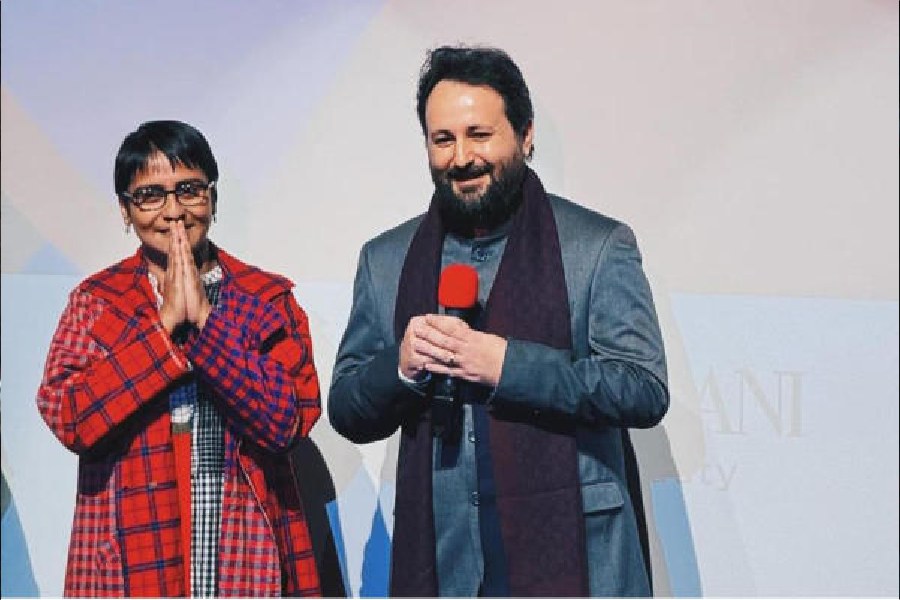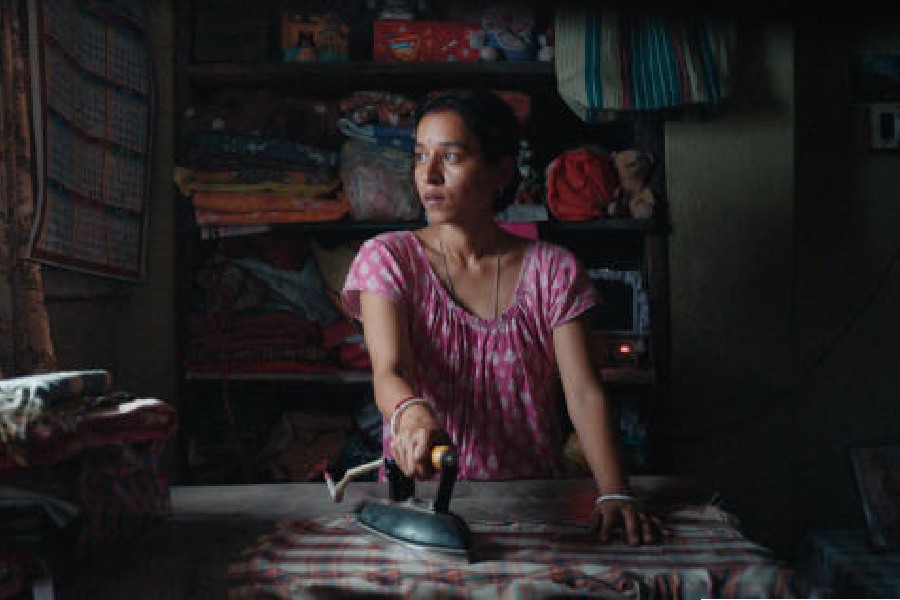Baksho Bondi, a film about a woman’s resilience in the face of all odds, just had its international premiere at the Berlin International Film Festival. Frontlined by Tillotama Shome — who plays the central role of Maya, a wife and mother who has to fend for the family, even as she emerges as a caregiver of sorts to her husband, a former Army man suffering from post-traumatic stress disorder — Baksho Bondi/ Shadowbox is the maiden feature film directorial of the husband-wife duo Tanushree Das and Saumyananda Sahi. The film, which is in the Bengali language, counts names like Vikramaditya Motwane, Nikkhil Advani, Jim Sarbh and Shaunak Sen, among many others, in its list of producers and executive producers. Before they headed off to Berlin, The Telegraph chatted with Tillotama and the directors.
How special is it to get to premiere Baksho Bondi at the Berlin International Film Festival?

Directors Tanushree Das (left) and Saumyananda Sahi at the Berlin International Film Festival
Saumyananda Sahi: When I was 17, I made a short film that took me to the Berlin talent campus and I had workshops with filmmakers like Wim Wenders and Ridley Scott. That changed my life and took me down this path. Getting to premiere our first feature film at Berlin, 20 years after that experience, feels like a full-circle moment.
Tanushree Das: This story is personal to me and to think that the world will watch this story, hear these voices and see these people is a great feeling. There is an (Chimamanda Ngozi) Adichie quote which says that telling your own story is privilege and telling the stories of others is power. I have a turn on that phrase — in India, telling other people’s story is privilege but to be able to tell your own story is power. For me, it is a big thing to get to that stage and to be on that platform.
Tillotama Shome: Getting to premiere at Berlin is testament to the hard work that Saumya and Tanushree have put in, and to the purity and strength of their voices, their stories and the people that they are. I have never been to Berlin before and this film is a gift that keeps giving.
It has taken a lot of hard work on our part to hold the film together for the last five-six years and I am really looking forward to watching it for the first time with an audience.
What was the starting point of Baksho Bondi?
Tanushree: My dad passed away in 2018 when he was only 64. It was late when we discovered he had depression and I was also in the postpartum phase... it was a very dark time. It was also a time when I wanted to make sense of all of it and Saumya was always there for me. The story of this film became a ladder for me to climb out of that darkness.
The inspiration for the film came from seeing my mother and many other women go through their life and do a lot of things and I always wondered where their strength came from. With this film, I wanted to understand where this love and strength stemmed from.
Saumyananda: We shot the film in Tanushree’s hometown (Barrackpore), in the area where she grew up and on the same streets that she walked on and played in as a kid. I was also able to bring in memories of my childhood. I had a friend whose father thought he was ‘God’ (like Sundar, played by Chandan Bisht, in Baksho Bondi)... and he would come and disrupt the classes because he didn’t like that his son was being taught by teachers. While my friend was embarrassed, at the same time, he would stand up for his father. If anyone laughed at him, the son would get into a fight. When we were about nine, my friend’s father was run over by a train... he tried to stop a train and he died. A year later, there was a writing assignment in school and we were asked to write about a hero. While most of us chose a sportsman and other public figures, my friend had written about his father. He stood up and read it out to the class and the pride he had while doing so remains a very striking memory for me.
When we started working on the script, it was important that the entry point be that of looking at the difficult love of every member of a family, but to see it from the inside and to understand what that love was, what its dynamics were, what the difficulties were, and also the sense of immense pride and resilience that it had.
Tillotama, you are known to embrace your characters like second skin. Baksho Bondi is no exception... it seems like you have been Maya all your life. What is it you felt for her that came out on screen so vividly and powerfully?
Tillotama: Saumya and Tanushree were generous to make me a part of the process. I had read many of their drafts, when they were writing the script. There are many scenes that may not be in the film, but they live inside me. Anamika Haksar (theatre director) did a workshop with Chandan, me and our child (played by Sayan Karmakar) and those workshops became great spaces for me to observe and build my own sense of the story. I observed their bodies, their eyes and the way they move and I created my own memories. Tanushree also shared things personal to Maya... like the kind of music she would listen to, her rumaal (handkerchief), her watch, her detailed hisheber boi (accounts book)... letters that Sundar and Maya would have exchanged, the images of homes and spaces in Barrackpore.... When these things ferment with time inside you, they grow into something. It cannot be explained. Maya is a composite of many women that Saumya and Tanushree knew... that got added to the many women that I knew and that Maya reminded me of. As a result, she grew bigger and bigger. She may have begun as some parts of many women but as she started growing, she took a life of her own.
On a personal level, the script came into my life at a time when I became a caregiver to my mother. It became a living, breathing thing and was no longer something I was trying to empathise with. At that time, my body understood what the wounds of exhaustion were... being a caregiver is not a short-term fix, it is a long haul for which you have to alter your life. We were living the meat and bones of this film on a day-to-day basis. This film came to our lives at a time when we needed it the most.
Authenticity is truly the bedrock of Baksho Bondi. There doesn’t seem to be a single false note in the film...
Tillotama: It is authentic because it is so personal for Tanushree and Saumya. Also, seeing Tanushree back in Barrackpore in that same neighborhood really played with my mind. As she walked through those roads which she had walked on as a child, I was curious to know what she felt. The film has a lived-in feeling because of the depth of their research and how personal it is and how they were able to share it so generously. They shared very private things with me, which also enabled me to share very private moments from my life with them and they have now become a part of my family. That happens rarely, even in the best-mounted project.
And you always wanted to name it Baksho Bondi/ Shadowbox?
Tanushree: Baksho Bondi felt apt because all the women in the film, even the minor characters, are struggling within their limited spaces. We struggled with the English name because we couldn’t find the corresponding meaning to it. There are many Bengali words that can’t be translated... even Tamil has certain words which are composite and mean a whole universe in themselves.
A lot of prominent names — Vikramaditya Motwane, Nikkhil Advani, Jim Sarbh, Shaunak Sen, among others — have put their weight behind your film. Tillotama herself is a producer in this film. How far do you think that will help Baksho Bondi in having long legs, both at festivals and in theatres?
Saumyananda: Yes, we didn’t start with 17 producers! (Laughs) We only started with Naren (Chandravarkar), and then people joined in because of necessity at various points of the journey. They came on board because they responded to the script. The fact that we had also worked with some of them previously helped. I had worked with Shaunak and Aman (Mann) on All That Breathes and with Prashant (Nair) on Trial By Fire, with Vikram (Motwane) on Black Warrant. Then through them, other people joined in. The support and the generosity that they have shown has been really overwhelming. They were really insightful and also very sensitive in how they responded, not as producers, but as comrades on this.
Tanushree: For them, it was never about big names attaching themselves to a relatively small project. Whoever has come at whichever stage, they have been very important at that stage.
Saumyananda: Everyone also came on board with the sentiment that there is a gap that independent Indian films have in terms of finding finance and we don’t have that much support from any state funding. So we are looking for international grants whose cycles are very long drawn out and very competitive and even when you get it you still require equity funding. They all felt that by coming on board, they were also giving back in some way to the industry that they were part of and acknowledging the importance of community to help films getting made.










